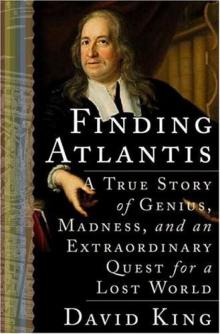Finding Atlantis: A True Story of Genius, Madness, and an Extraordinary Quest for a Lost World 

by David King
Genre: Other10
Published: 2015
View: 2715
Read OnlineRead Finding Atlantis: A True Story of Genius, Madness, and an Extraordinary Quest for a Lost World Storyline:
The untold story of a fascinating Renaissance man on an adventurous hunt for a lost civilization—an epic quest through castles, courts, mythologies, and the spectacular world of the imagination.What do Zeus, Apollo, and the gods of Mount Olympus have in common with Odin, Thor, and the gods of Valhalla? What do these, in turn, have to do with the shades of Hades, the pharaohs of Egypt, and the glories of fabled Atlantis? In 1679, Olof Rudbeck stunned the world with the answer: They could all be traced to an ancient lost civilization that once thrived in the far north of Rudbeck’s native Sweden. He would spend the last thirty years of his life hunting for the evidence that would prove this extraordinary theory.
Chasing down clues to that lost golden age, Rudbeck combined the reasoning of Sherlock Holmes with the daring of Indiana Jones. He excavated what he thought was the acropolis of Atlantis, retraced the journeys of classical heroes, opened countless burial mounds, and consulted rich collections of manuscripts and artifacts. He eventually published his findings in a 2,500-page tome titled Atlantica , a remarkable work replete with heroic quests, exotic lands, and fabulous creatures.
Three hundred years later, the story of Rudbeck’s adventures appears in English for the first time. It is a thrilling narrative of discovery as well as a cautionary tale about the dangerous dance of genius and madness.
From Publishers Weekly Few lives are as sadly instructive as that of the dreamer who, by reaching for the stars, falls crashing to earth. Such is the tale of a 17th-century Swedish polymath and gifted eccentric, Olof Rudbeck. Univeristy of Kentucky historian King relates how Rudbeck, trained in his youth as physician (he discovered the lymphatic glands), mastered fields as diverse as architecture, botany, shipbuilding, etymology, musical composition and mythology, among others. It was an ancient Norse saga that set him on the path to what he believed would lead to his greatest triumph. Enchanted by circumstantial evidence and supported by his own breathtakingly inventive archeological and etymological research, Rudbeck in 1679 astonished his Uppsala University colleagues with the announcement that he had discovered Atlantis—in Old Uppsala. Fiercely disputatious and uncompromising when it came to his own genius, Rudbeck had previously poisonously offended many influential colleagues; his work was ridiculed and he died in obscurity. King is marvelous at elaborating Rudbeck's theories and his heroic defense against charges of forgery and "foul-ugly fraud." One wishes, however, that King had dealt definitely with the forgery charges. His trust in his own subject despite the evidence is honorable but perhaps misplaced. Still, King tells his tale with the pace and appeal of a classic whodunit.
Pages of Finding Atlantis: A True Story of Genius, Madness, and an Extraordinary Quest for a Lost World :